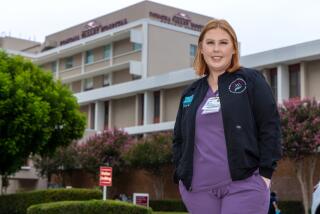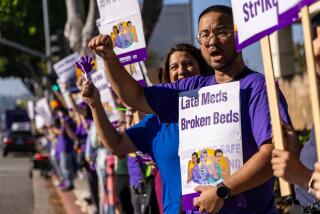‘California Angels’ Fly Into Face of Disaster
- Share via
BATON ROUGE, La. — As the state capital’s largest public health hospital, the Earl K. Long Medical Center routinely accepted people other institutions didn’t like to, or simply wouldn’t. But immediately after Hurricane Katrina struck, the hospital, critically short of staff, began turning away desperate New Orleans evacuees who not only couldn’t pay but who had just lost everything.
The hospital, whose mission it is to care for those whom no one else does, was forced to close to new patients. Amid the scramble and chaos, hospital officials weren’t sure how many were refused aid.
Then the California nurses came.
The first wave of about 30 volunteers landed within four days of the disaster, immediately helping the medical center to almost double its patient load. The nurses, from across California, rapidly integrated into the overburdened facility, relieving weary local nurses and expanding overall levels of care in all parts of the hospital.
Since the California nurses arrived in Baton Rouge, the hospital has been forced to divert patients only a couple of times -- but just for hours, not days. One of those blackout periods came during the transition between the first and second waves of California nurses.
“They are our California angels,” said A.J. Barbier, the director of the medical center’s nursing staff. “They received a round of applause when they showed up.”
On Tuesday, the third wave of California nurses is slated to relieve the current crew.
In all, hundreds of registered nurses from California -- on their own or funneled through charitable organizations like the Red Cross -- have flown to the Gulf Coast, often on a moment’s notice.
A substantial part of the nursing relief effort in Louisiana has been spearheaded by the California Nurses Assn., which has dispatched 200 volunteers and spread them between the Long facility and a facility in nearby Lafayette, and is now gearing up to supply four new clinics at Tulane University in New Orleans.
“Our nurses are giving care to many people who have gone without care for much of their lives,” said Rose Ann DeMoro, the nursing union’s executive director. “In a civilized society, not caring for our own is a disgrace and an embarrassment for us to the rest of the world.”
The union, which represents 63,000 nurses in California, is poised to send still more members to the region -- 1,000 more have volunteered -- but funds are not available to cover the $1,500 in travel and other expenses it takes to send each nurse.
As it is, the volunteer nurses leave behind their colleagues, families and often their paychecks. A few nurses have vacation time to cover the roughly 10-day stints, but most are taking unpaid leaves.
“These people have lost everything,” said Jim Van Fleet, 48, who works at UC Davis Medical Center in Sacramento and has been in Baton Rouge for two weeks. “So I’m not getting paid. Big deal, so what.”
The main focus of the California nurses has been Long medical center. The 219-bed facility, which shares a neighborhood with convenience stores, check-cashing stands and a strip bar, admits all the patients it can handle. It takes prisoners from the city’s four nearby jails, the poor, and the uninsured, which regularly accounts for the bulk of its patient load.
The California nurses found the hospital by making calls to see where the biggest need would be after the disaster. There was little doubt it would be the public health facility in the state capital, about 75 miles northwest of New Orleans, which would be absorbing the most evacuees.
Like much of the nation in the early days of the disaster, the nurses were deeply moved by the images of the suffering in the region, and in New Orleans in particular.
“Everything I saw on television was unbelievable. Just heartbreaking,” said Maureen Griffin, a 52-year-old registered nurse from San Bruno who has been at the Long facility for more than a week. “I’ve always wanted to do something like this, but I have a daughter. Well, she’s 9 now and I decided I was tired of being frustrated by doing nothing.”
In many recent national disasters, officials have discovered people want to help, but bureaucratic hurdles often frustrate those altruistic impulses. Volunteers show up only to be turned away, usually for reasons of insurance liability.
But shortly after Katrina struck, Louisiana officials signed an emergency order that allowed volunteer nurses to get to work almost immediately. A process that normally would take weeks, even months, was reduced to 10 minutes. With a photo ID and a copy of their nursing license, California nurses could begin helping patients.
“Patient care is patient care,” Van Fleet said after administering 2 milligrams of morphine to a bone cancer patient who recently underwent reconstructive jaw surgery.
As nurses, they’ve witnessed their share of blood, pain and misery. It’s part of their routine. And, indeed, within moments of being assigned to the emergency room, one nurse was part of a medical team that tried to restart an evacuee’s heart. The team failed.
But what they hadn’t experienced was caring for victims of the nation’s worst natural disaster from society’s lowest social rung. Many of the hospital’s patients are elderly people with chronic conditions such as heart and respiratory problems and diabetes.
As the nurses pointed out, just moving an elderly person to a different room -- not even one with a medical condition -- can be a strain. And these patients were pulled off rooftops, loaded onto boats or helicopters, then forced to stay in one or more shelters before finally being taken to Baton Rouge.
One 83-year-old heart patient, who uses a wheelchair, said she spent four days in the Superdome. Or maybe it was another shelter. She was so disoriented, nurses weren’t sure she knew where she had been.
“Everyone is overtired and stressed, but what we really try to do is to be more open to just listening to them,” said Sonia Smith, 50, a registered nurse from Danville who has been at Long for over a week. “They’ve been through so much. They have a story to tell and we just try to be as empathetic as possible.”
The nurses are staying in the hospital’s old pediatrics ward on the fifth floor.
They sleep in shifts in rooms with six beds each. Their limited downtime is mostly spent talking quietly or reading. A countertop at the nurse’s station holds a copy of “Till Morning Comes,” a love story with a political backdrop written by a doctor.
They rarely get outside the hospital, but still try when they can to explore Baton Rouge. In fact, their bulletin board held a sign-up sheet for those wishing to attend a weekend prisoners’ rodeo. Two names were on it.
Toward the end of a grueling day, Barbier, the hospital’s nursing director, is back in her cramped office, a jumble of stacked books, files, diapers and bedpans. It’s the picture of someone struggling to get back on top of things.
She’s asked why the Californians came. Her phone, as it has done constantly for the past month, rings again. Her eyes well up with tears, and above the drone of the air conditioner, she replies in a voice barely audible: “Because they’re nurses.”
More to Read
Sign up for Essential California
The most important California stories and recommendations in your inbox every morning.
You may occasionally receive promotional content from the Los Angeles Times.













